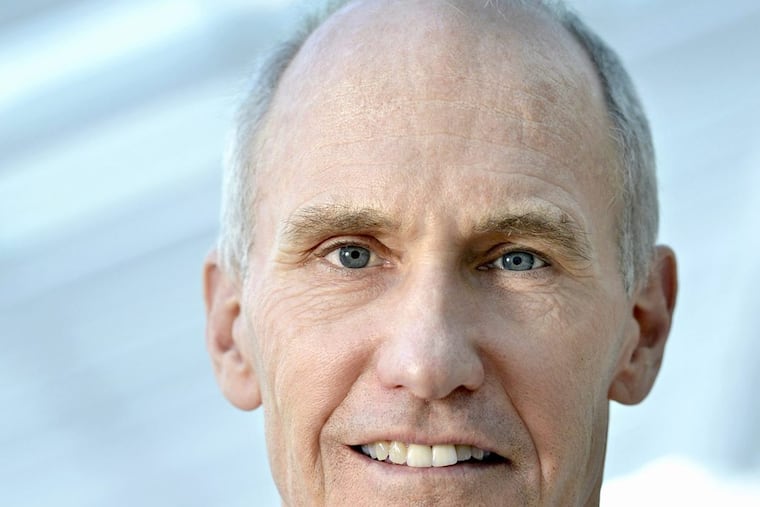Penn invests $50 million in biotech in a bold bid to build Philly’s innovation cluster
"Firms Penn backs must agree to maintain headquarters in Philadelphia."

Without fanfare, the University of Pennsylvania has agreed to invest up to $50 million over the next three years in at least 10 biotech companies, the Inquirer has learned.
The goal of the pilot program is to convince more local Ph.D.s and M.D.s to establish their companies near the school's West Philadelphia campus, instead of moving to traditional venture-capital centers in Massachusetts, California, and other states where funding has been more readily available, until now.
Penn has set the following conditions, according to people familiar with the program, which has begun but not been publicly announced:
The firms Penn backs must agree to maintain headquarters in the Philadelphia region.
Each company must also collect larger funding commitments from one or more major investment firms specializing in biotech companies, ensuring Penn's money is leveraged to attract total investments in the tens or hundreds of millions of dollars for each target firm.
The outline of the program was confirmed by Penn officials including Kevin B. Mahoney, chief administrative officer for the University of Pennsylvania Health System and vice dean at Penn's Perelman Medical School:
Mahoney said the expanded pilot co-investment policy has four broad objectives, such as bringing novel treatments to patients quickly and safely, and supporting faculty initiatives. The university also hopes to attract more money to diversify Penn's research portfolio and get more non-federal funding. Finally, Mahoney said, the pilot's mission is "to build the Philadelphia innovation ecosystem to create jobs, synergy and an innovation cluster around Penn technology and spin outs."
The move follows breakthroughs in cell and gene altering techniques at Penn and elsewhere that have attracted financial commitments from drug firms, foundations, venture and private equity firms.
Earlier this year, Tmunity Therapeutics, a T cells-based company set up by Penn cancer researcher Carl June and his partners, raised more than $100 million from the China-based Ping An insurance group, California-based Gilead Biosciences, and other U.S. and Asian investors.
Penn's $5 million investment in Tmunity is being counted as the first investment in the university's biotech program.
Other pilot-program investments include one in Tycho Therapeutics, headed by Wharton adjunct professor Steven Nichtberger.
Still other candidates include firms such as Carma Therapeutics Inc., which is developing cellular immunotherapies based on work begun in the lab of Penn assistant professor Saar Gill to attack cancer tumors. Carma on June 12 announced that it "closed an initial financing" led by AbbVie Ventures, which has offices in Boston and San Francisco. In April, Carma executives told the SEC that it had borrowed $3.9 million for short-term funding. A Penn investment in Carma is expected to come soon.
Besides these direct investments, medical school officials also hope to develop manufacturing support and software services that can be used by companies supported by the investment program to ramp up production. Future funding could also go to start-ups that include faculty from other schools, though that is still a long way off.
Philadelphia biotech entrepreneurs have complained for years of a perceived lack of local funding sources.
Quaker Partners, whose partners included Philadelphia real estate and private equity investor Ira J. Lubert, and the late Glaxo executive Brenda Gavin, raised $700 million in the 2000s for biotech investments in the Philadelphia area and other markets, but results have been slow: Of a total of $200 million invested by the Pennsylvania state and public school workers' pension systems in the plan, just $135 million had been returned by 2017, more than ten years later, according to state investment records. These investments have yet to deliver a profit for the pensions, which face large long-term deficits.
"If Philadelphia wants to be a major power in biotech, it needs to raise more money, more venture capital," observed Felix Hsu, senior vice president at WuXi AppTech, which employs 600 manufacturing cell-based therapies and other cutting-edge products in three buildings at the former Philadelphia Navy Yard.
Hsu said venture capital firms from Boston, San Francisco and Seattle have backed Philadelphia scientists, but more often "the technology has been developed here and moved to Boston, because that's where the funding was and the whole support network. It's fascinating, because the cost of living is greater in Boston and San Francisco than in Philadelphia. But those cities are where the critical mass is," and scientists often follow the money.